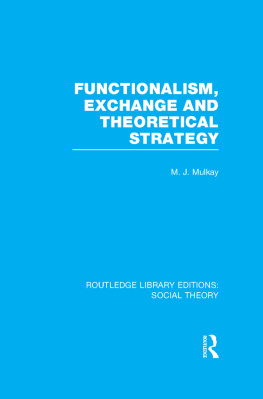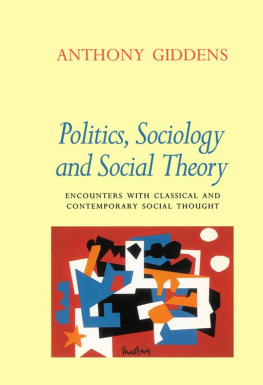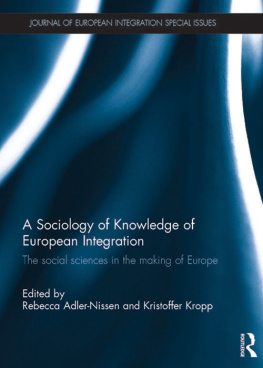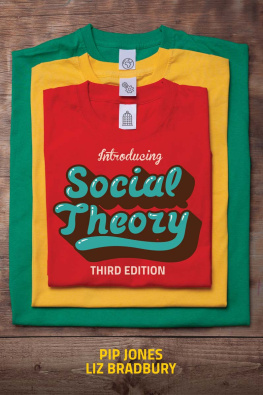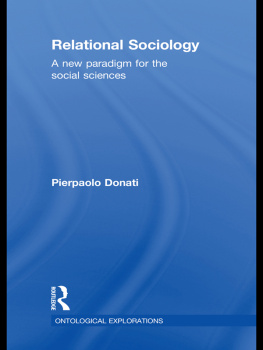ROUTLEDGE LIBRARY EDITIONS:
SOCIAL THEORY
Volume 60
SCIENCE AND THE SOCIOLOGY OF KNOWLEDGE
First published in 1979
This edition first published in 2015
by Routledge
2 Park Square, Milton Park, Abingdon, Oxon, OX14 4RN
and by Routledge
711 Third Avenue, New York, NY 10017
Routledge is an imprint of the Taylor & Francis Group, an informa business
1979 George Allen & Unwin (Publishers) Ltd
All rights reserved. No part of this book may be reprinted or reproduced or utilised in any form or by any electronic, mechanical, or other means, now known or hereafter invented, including photocopying and recording, or in any information storage or retrieval system, without permission in writing from the publishers.
Trademark notice: Product or corporate names may be trademarks or registered trademarks, and are used only for identification and explanation without intent to infringe.
British Library Cataloguing in Publication Data
A catalogue record for this book is available from the British Library
ISBN: 978-0-415-72731-0 (Set)
eISBN: 978-1-315-76997-4 (Set)
ISBN: 978-1-138-78247-1 (Volume 60)
eISBN: 978-1-315-76340-8 (Volume 60)
Publishers Note
The publisher has gone to great lengths to ensure the quality of this reprint but points out that some imperfections in the original copies may be apparent.
Disclaimer
The publisher has made every effort to trace copyright holders and would welcome correspondence from those they have been unable to trace.
First published in 1979
Second impression 1980
This book is copyright under the Berne Convention. All rights are reserved. Apart from any fair dealing for the purpose of private study, research, criticism or review, as permitted under the Copyright Act, 1956, no part of this publication may be reproduced, stored in a retrieval system, or transmitted, in any form or by any means, electronic, electrical, chemical, mechanical, optical, photocopying, recording or otherwise, without the prior permission of the copyright owner. Enquiries should be sent to the publishers at the undermentioned address:
GEORGE ALLEN & UNWIN LTD
40 Museum Street, London WC1A 1LU
George Allen & Unwin (Publishers) Ltd, 1979
British Library Cataloguing in Publication Data
Mulkay, Michael Joseph
Science and the sociology of knowledge
(Controversies in sociology).
1. ScienceSocial aspects
I. Title II. Series
ISBN 0-04-301093-8
ISBN 0-04-301094-6 Pbk
Typeset in 10 on 11 point Times by Red Lion Setters, London
and printed in Great Britain
by Biddies Ltd, Guildford, Surrey
I wish to thank Tom Bottomore and John Law for reading the first draft of this book very carefully and for making a number of helpful comments and suggestions. I would also like to thank Elizabeth Chaplin for her help in preparing the final manuscript and Michael Holdsworth for giving me a special dispensation to exceed the usual length for contributions to this series.
Possibly the world of external facts is much more fertile and plastic than we have ventured to suppose; it may be that all these cosmologies and many more analyses and classifications are genuine ways of arranging what nature offers to our understanding, and that the main condition determining our selection between them is something in us rather than something in the external world.
E. A. Burtt, The Metaphysical Foundations of Modern Science, p. 305
If we cannot bear the paradox of accepting that genuine knowledge may be fallible, then we must ban the term altogether from productions of the human intellect.
J. R. Ravetz, Scientific Knowledge and Its Social Problems, p. 236
The sociology of knowledge has a long history. Its origins are sometimes traced back as far as the writings of Francis Bacon, and it certainly appears as an important element in the work of the founding fathers of sociology, such as Marx, Pareto and Durkheim. It continues to be a thriving area of investigation today, although its practitioners have tended to concentrate increasingly on detailed studies of specific bodies of knowledge and belief, instead of presenting the kind of general analytical formulae favoured by their forebears. Despite this long tradition, little agreement has been achieved. The field is still characterised by a great diversity of aims and interpretative schemes. This is true to such an extent that some authors are unwilling to offer any definition at all of the sociology of knowledge (Curtis and Petras, 1970, p. 7), whilst those who risk making the attempt are forced to devise very general formulations in order to cover the entire corpus of relevant literature and encompass the full range of phenomena to be studied. Thus Merton (1957, p. 456), having noted that the term knowledge must be interpreted very broadly indeed in this context as covering virtually the entire gamut of cultural products, writes that the sociology of knowledge is primarily concerned with the relations between knowledge and other existential factors in the society or culture. General and even vague as this formulation of the central purpose may be, a more specific statement will not serve to include the diverse approaches which have been developed. Within the wide range of issues covered by such a definition, one reasonably clear distinction can be made, namely, that between popular belief and commonsense or everyday knowledge, on the one hand, and systematised, specialised knowledge, on the other hand (Berger and Luckmann, 1967). In this book, I shall be concerned exclusively with the latter, that is, with the sociological analysis of specialised knowledge.
One of the central concerns of sociologists of knowledge has been to show how specialised bodies of thought and knowledge, such as aesthetic, moral and philosophical systems, religious creeds and political principles, are influenced by the social and cultural contexts in which they are produced. The guiding assumption behind this kind of analysis is clearly expressed by Mannheim. It is that the sociology of knowledge explores the varying ways in which objects present themselves to the subject according to differences in social settings when and where social structures come to express themselves in the structure of assertions, and in what sense the former concretely determine the latter (1936, p. 265). This general statement leads immediately to a number of more specific questions. We are led to ask, for instance: what kinds of social and cultural factors exercise an influence on mental productions and in what degree? What kinds of connections are there between social and cultural influences and mental productions? Which aspects of these mental productions are we trying to account fortheir form, their content, their incidence, their generation or their acceptance? And most important of all, for the purposes of this chapter, which mental productions are open to this kind of sociological analysis? Are we to include all cultural products or only certain classes of them?
When we examine which areas of knowledge have actually been subject to empirical investigation, we find that scientific and mathematical thought has been almost completely ignored by sociologists. I do not mean by this that there have been no sociological studies of scientists or of the scientific community. What has been absent, until very recently, has been the empirical investigation from a sociological perspective of scientific knowledge and its social construction. In addition, although most sociologists of knowledge have discussed science in general terms, they have repeatedly rejected in principle the possibility that the form or content of scientific knowledge, as distinct from its incidence or reception, might be in some way socially contingent. Instead, they have argued strongly, albeit with occasional uncertainty, that the substance of scientific knowledge is independent of social influence and they have tried to justify this assertion on philosophical grounds. They have claimed, in short, that science is a special sociological case because it has a special epistemological status. Because this line of reasoning has been generally accepted, sociologists have left the close analysis of scientific knowledge to the philosophers of science and to the historians of ideas.


